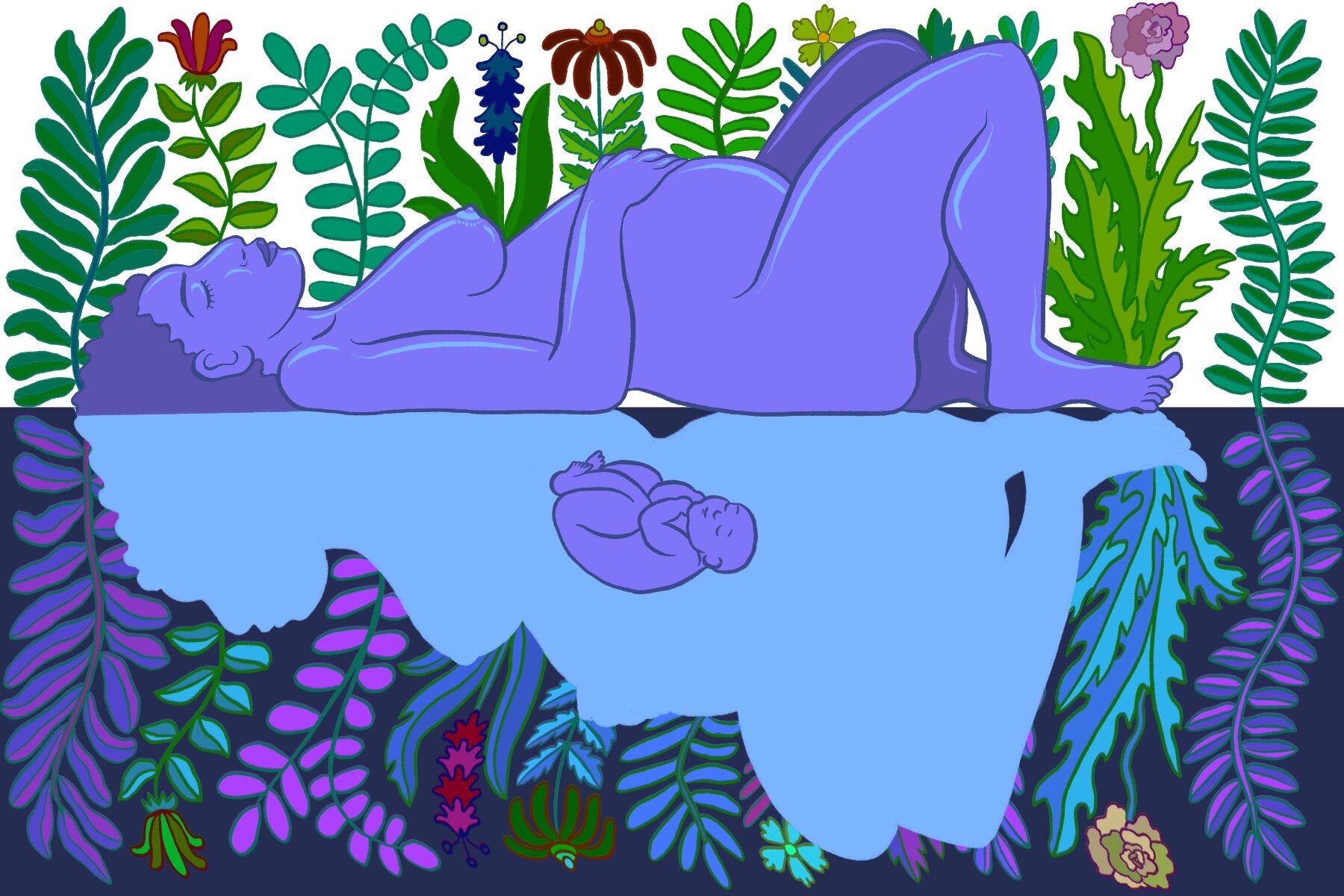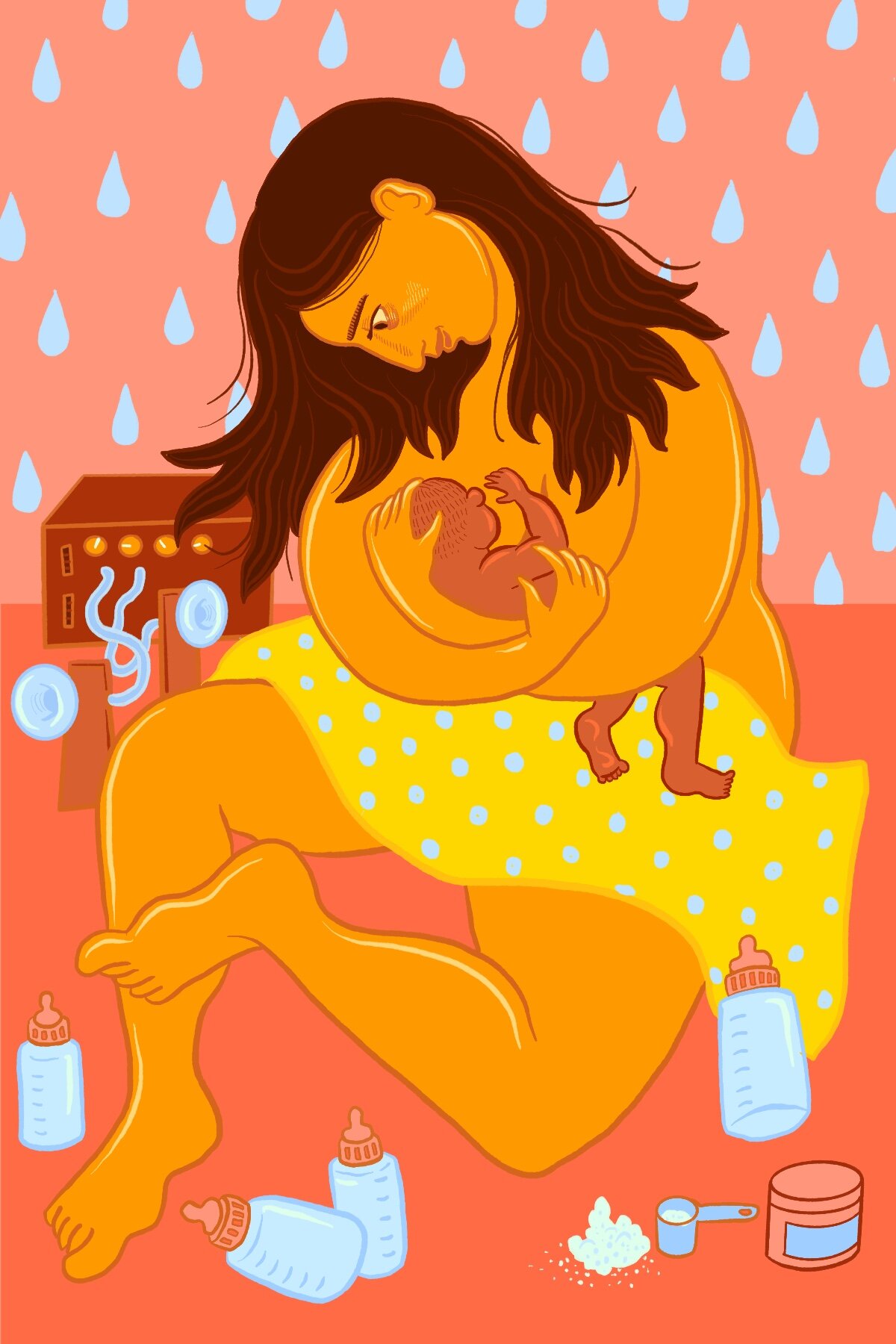You Forget the Pain: Pt. 1
“For a long time we didn't think we wanted to have kids. Once we got married, we got closer and liked the idea of having a family together, fortifying our bond in a way. Raise a person! Be a parent. Enter a different world that is very different than the world before kids.”
At the time, Andrea and her husband were far away from their own families, and this helped motivate the urge to start a family of their own.
“Being an aunt also had something to do with my wanting to be a parent. It was just closer to home for me than any other kid or baby I'd seen before. I felt genuine love and a need to protect and nurture this little person for the first time. I could see my brother and his wife going through the process and could, for the first time, imagine what that would be like. Of course, my niece was nine when my first son was born, so it didn't happen overnight!”
Once Andrea and her husband made the choice, the set about planning to conceive.
“We had no idea about whether or not we could have kids and hoped that it would work. My husband is a school counselor, and we planned to have the baby at the time where he would be off from work, and then I would have my maternity leave—a total of five months at home. I knew all about timing with my cycle, so there was a week where we went "this is the time!" and did it a million times that week. It was less beautiful and lovely and fun, more like a chore and stressful, but I guess it worked. I got pregnant really easily in the first month. I was 34 at the age of the first birth, and now I have two kids: one who is seven, and one who is four, both boys.
Neither partner cared about gender, they just wanted healthy babies.
Andrea and her husband had bought a house and shored up employment, and for the most part, their daily lives didn't really change. Well, except for a few minor inconveniences.
“I was pissed. I wanted to eat sushi, soft cheese, and cold cuts! It annoyed me that I couldn't have them. I'm sure people in France are eating Brie!”
Andrea loved being pregnant and felt great.
Illustration by Marnie Galloway
“People told me I was glowing. Generally, people were very accommodating and nice, unless it was on the subway. Usually, it took a woman halfway down the train to notice and offer a seat, and a man right in front of me wouldn't see me or give the seat.”
But, pregnancy did not come without some physical ailments. Towards the end of the first pregnancy, her right side grew numb if she stood up too long, and often she would get down on all fours to find relief. Additionally, she had a Varicose vein on outside of her vagina all in the last trimester. With the second pregnancy, all of these physical challenges started in the first trimester.
“I had to wear the support belly thing. I got hemorrhoids. It was enough that I said ‘I am done after two!’”
* * * * * *
They were excited and nervous.
“It’s impossible to know about all of this before your own kids. I felt overwhelmed and tried to read everything I could. I wanted to be prepared. Nothing can ever prepare you no matter how many books you read!”
They grew closer knowing that they had a new person joining their family that was part of both of them. Feeling the baby move is one of her favorite things in life, ever. It was incredible, and the number one thing she misses about being pregnant.
“Of course, I had no idea who he was, but gradually it got more real.”
The first baby:
Andrea wanted to do a natural child birth, but she knew that she was not going to have a natural child birth the way she wanted with a medical doctor. She was 38.5 weeks pregnant, and had finished an episode of Lost. She was at the end of her rope. “Babe, please make this stop!” she would say to her husband, but she still had a few weeks left.
That night, Andrea went to sleep, and an hour later around 11:30pm, she stood up and realized that her water had broken. Yet, she was not in labor. Once she arrived, the medical team induced her.
“At 1:00am, they gave me Pitocin, but I was still determined to do it naturally. For 15 hours I was on Pitocin, and once you have that, it isn’t natural. I tried to breathe through it. The doctors don’t want you sitting in the hospital in labor, and I was only five centimeters dilated. Then the nurse, who was cranky and mean, told me ‘They are going to make you have this baby whether you want to or not. Either get the epidural or a c-section.’”
Well, then!
Andrea, feeling pressured and exhausted and frustrated, received the epidural, and 2 hours later started pushing. At six that evening, she gave birth to her first-born. Andrea retained a lot of water after birth and says her body “swelled up like balloon.” Andrea also has multiple sclerosis, but it affected her little during pregnancy. It was after the first birth that she had a relapse including carpel tunnel and numbness in her fingers.
The second baby:
With her second pregnancy, Andrea was under the care of a midwife. Her body was in slow labor for a month prior to her delivering her baby. She was nearly six centimeters dilated during this time, and began the “Come on, baby!” regimen of Castor oil, spicy foods, walking, and everything else to induce labor. But, as many other mothers can attest to, her efforts were in vain. The night before her due date, Andrea’s midwife took her to hospital and broke her water, and five hours later, she gave birth.
“It was excruciatingly painful and so intense. A ring of fire! It was also much quicker. I was afraid to push, because I thought my vagina was going to rip in half. Looking back, I can’t quite remember the pain, but my husband said that it was like watching someone endure torture. That particular year, Andrea was in graduate school working on her Masters degree, and doctors discovered that she had precancerous cells and scar tissue on her cervix making it difficult to dilate. Her midwife had to hold open part of her cervix for child to pass through. Even through all of this, Andrea’s recovery was overnight, which was in stark contrast to recovery after her first birth.
If Andrea were ever to conceive again, she would have another natural birth, because she felt it was lot better for her physically and for the baby. And as I have heard time and time again, “you forget the pain.”
* * * * * *
After both babies, Andrea was hesitant to have bowel movement. “No more pushing, please!” She had vaginal stitches both times, and used a tried-and-true recipe of frozen maxi pads doused with witch hazel to soothe the pain and irritation. Prior to having babies, Andrea had hemorrhoids, so that wasn’t new. And she felt like her belly, much like Santa Claus, was a big bowl of jelly. Andrea also shares that, “You continue to have cramps as your uterus shrinks, especially when you breastfeed.”
The second time around, she knew what to expect, and it was the pits. She bled for six weeks, which is not terribly uncommon.
“My brother told me the first year is a war zone! You’re putting out fires left and right. There needs to be an “It gets better campaign” for parents. At some point, you will do things like a normal person again, like eat a meal, and take a shower.”
Andrea breastfed both of her children, and after the first month, started adding in formula. Because she has multiple sclerosis, Andrea knew that she would have to go back on medication. She also tried to pump, but it was stressful, and her MS was inhibiting her from feeling well.
Illustration by Marnie Galloway
“It was more important to take medication and feel well rather than breastfeed. I made a very conscious decision.”
For the second baby, it was nearly the same situation, with the exception that newly family of four were in the process of selling their home and moving; Andrea spent her whole maternity leave packing a house. Again, she breastfed for a few months, supplementing with formula, and at a certain point, wanted to go on medication. Furthermore, Andrea wanted to have her body back.
“When I was pregnant, there was so much time my body was not my own. Our bodies are purely in service of another person. I have never been so proud and honored to be a woman when I saw what my body was capable of. I was awed by that process, how the breasts, vagina, and hips change to prepare. Women are freaking awesome! Even though I wanted to be my own person again, I have to say that I miss that too. Something about that connection.”
When it was time for Andrea to return to work, it was difficult, especially after the first baby. She says that she is a “free independent woman,” but remembers coming to work and feeling like she was ready to turn around and go right back home.
“I wanted to go see my children, and it was hard to put in a full day.”
Andrea would run from the bus stop to get home, and could not wait to see baby. Her son was a part of her body, and she fed him with her body. To be disconnected was really hard, and after a certain number of hours, Andrea had a real physical need to see baby. Practically, she also needed to pump. But knowing that her baby was home with her partner made the transition to work easier.
(Continue to You Forget the Pain: Pt 2)

